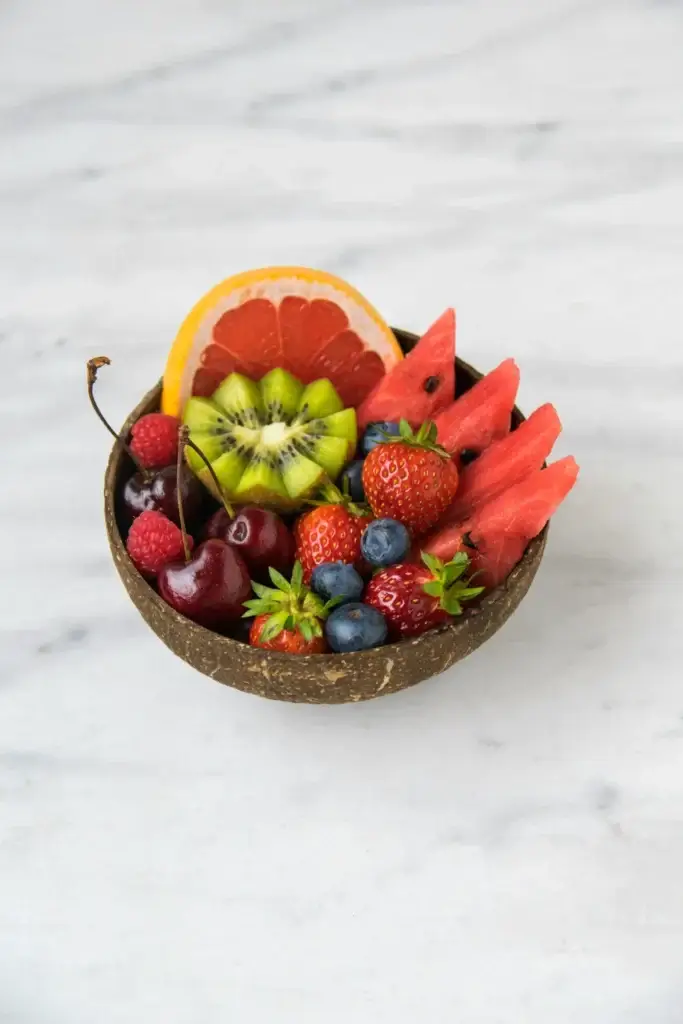Fruits are not only delicious but also packed with essential nutrients that are vital for good health. They are a rich source of vitamins, minerals, fiber, and antioxidants, which help to protect our bodies against various diseases and promote overall well-being. Including a variety of fruits in your diet can provide numerous health benefits and contribute to a balanced and nutritious eating plan.

One of the key reasons why eating fruits is important for good health is their high content of vitamins and minerals. Different fruits contain different vitamins and minerals, and by consuming a variety of fruits, you can ensure that you are getting a wide range of these essential nutrients. For example, citrus fruits like oranges and grapefruits are rich in vitamin C, which is important for immune function and collagen production. Bananas are a great source of potassium, which is necessary for maintaining healthy blood pressure levels. Berries, such as strawberries and blueberries, are packed with antioxidants that help to protect our cells from damage caused by harmful molecules called free radicals.
In addition to vitamins and minerals, fruits are also an excellent source of dietary fiber. Fiber is important for maintaining a healthy digestive system and preventing constipation. It also helps to regulate blood sugar levels and can contribute to weight management by promoting feelings of fullness. By including fruits in your diet, you can increase your fiber intake and support a healthy digestive system.
Furthermore, fruits are low in calories and high in water content, making them a great choice for those looking to maintain or lose weight. They provide a natural sweetness to your diet without the added sugars found in many processed foods and desserts. Eating fruits as a snack or incorporating them into meals can help to satisfy your sweet tooth while providing important nutrients.
Another benefit of eating fruits is their antioxidant content. Antioxidants are compounds that help to neutralize harmful free radicals in the body, which can cause oxidative stress and damage to cells. By consuming fruits that are rich in antioxidants, such as berries and pomegranates, you can help reduce the risk of chronic diseases like heart disease, cancer, and neurodegenerative disorders.
In conclusion, the importance of eating fruits for good health cannot be overstated. They are not only delicious but also provide a wide range of essential nutrients that are vital for our overall well-being. By including a variety of fruits in our diet, we can reap the numerous health benefits they offer, including improved immune function, healthy digestion, weight management, and protection against chronic diseases. So, make sure to incorporate a colorful array of fruits into your daily eating plan and enjoy the many benefits they provide for your health.
The Best Fruits for Your Body
While all fruits offer health benefits, some are particularly beneficial for specific aspects of our health. Let’s take a closer look at some of the best fruits you can eat to promote good health:
1. Blueberries: These small, vibrant berries are packed with antioxidants that help protect your body against damage from harmful free radicals. Blueberries are also rich in vitamin C, which supports a healthy immune system. Additionally, they contain fiber, which aids in digestion and helps maintain a healthy weight.
2. Apples: The saying “an apple a day keeps the doctor away” holds some truth. Apples are an excellent source of dietary fiber, which promotes a healthy digestive system and helps regulate blood sugar levels. They also contain a compound called quercetin, which has anti-inflammatory properties and may help reduce the risk of chronic diseases like heart disease and certain types of cancer.
3. Oranges: Known for their high vitamin C content, oranges are a great fruit to include in your diet. Vitamin C is essential for a strong immune system and helps protect against common illnesses like colds and flu. Oranges also provide a good amount of fiber, which aids in digestion, and they are a hydrating fruit, thanks to their high water content.
4. Avocados: While technically a fruit, avocados are often thought of as a healthy fat source. They are rich in monounsaturated fats, which have been linked to heart health and may help lower bad cholesterol levels. Avocados also provide important nutrients like potassium, vitamin K, vitamin E, and folate.
5. Strawberries: These sweet and juicy berries are not only delicious but also packed with health benefits. Strawberries are an excellent source of vitamin C, which supports a healthy immune system and helps your body absorb iron from plant-based foods. They also contain antioxidants and fiber, making them a great choice for overall health.
6. Bananas: Bananas are a convenient and versatile fruit that can be enjoyed on their own or added to smoothies, cereal, or baked goods. They are a good source of potassium, which plays a crucial role in maintaining proper heart and muscle function. Bananas also provide essential vitamins like vitamin C and vitamin B6.
7. Kiwi: This small, fuzzy fruit is not only delicious but also incredibly nutritious. Kiwis are packed with vitamin C, vitamin K, vitamin E, and fiber. They also contain an enzyme called actinidin, which aids in digestion by breaking down proteins. Kiwis are a great choice for supporting a healthy digestive system.
8. Pineapple: Known for its tropical flavor, pineapple is a fruit that offers numerous health benefits. It contains an enzyme called bromelain, which has anti-inflammatory properties and may help reduce pain and swelling. Pineapple is also a good source of vitamin C and manganese, which are important for immune function and healthy bones.
By incorporating these fruits into your diet, you can enjoy a wide range of health benefits. Whether you prefer them fresh, frozen, or in smoothies, fruits are a delicious and nutritious addition to any meal or snack.
1. Berries
Berries, such as strawberries, blueberries, raspberries, and blackberries, are not only delicious but also incredibly nutritious. They are packed with antioxidants, which help to protect our cells from damage caused by harmful free radicals. Berries are also high in fiber, which aids in digestion and helps to maintain a healthy weight. Additionally, they are a great source of vitamin C, which supports a strong immune system.
Berries come in a variety of colors, each offering its unique set of health benefits. Strawberries, for example, are rich in anthocyanins, which give them their vibrant red color. These compounds have been shown to have anti-inflammatory properties and may help reduce the risk of chronic diseases such as heart disease and cancer.
Blueberries, on the other hand, are known for their high levels of antioxidants, particularly flavonoids. These antioxidants have been linked to improved brain function and may help delay age-related cognitive decline. Research has also suggested that blueberries may have a positive impact on heart health by reducing blood pressure and improving cholesterol levels.
Raspberries are another berry that deserves attention for their nutritional value. They are an excellent source of dietary fiber, providing around 8 grams per cup. This fiber content helps regulate blood sugar levels, promotes healthy digestion, and contributes to feelings of fullness, making raspberries a great option for weight management.
Blackberries, with their deep purple color, are packed with vitamins, minerals, and antioxidants. They are particularly rich in vitamin C, providing over 30% of the recommended daily intake in just one cup. Vitamin C is essential for collagen production, which supports healthy skin, bones, and blood vessels. Blackberries also contain a significant amount of vitamin K, which plays a crucial role in blood clotting and bone health.
Incorporating berries into your diet is easy and enjoyable. They can be enjoyed fresh, added to smoothies, tossed into salads, or used in baking. However, it’s important to note that berries are highly perishable, so it’s best to consume them as soon as possible after purchase or freeze them for a longer shelf life.
In conclusion, berries are not only a delicious addition to any diet but also a powerhouse of nutrients. From their antioxidant content to their high fiber and vitamin levels, berries offer numerous health benefits. So next time you’re looking for a sweet and nutritious snack, reach for a handful of berries and enjoy all the goodness they have to offer.
2. Citrus Fruits
Citrus fruits, including oranges, lemons, grapefruits, and limes, are renowned for their high vitamin C content. Vitamin C is essential for a healthy immune system and plays a vital role in collagen production, which helps to maintain healthy skin, bones, and blood vessels. Citrus fruits are also rich in fiber and provide other beneficial vitamins and minerals, making them an excellent choice for overall health.
Citrus fruits are not only delicious but also offer a wide range of health benefits. One of the key reasons why they are so beneficial is their high vitamin C content. Oranges, for example, are known for being a great source of this essential nutrient. Vitamin C is a powerful antioxidant that helps protect the body against free radicals, which can cause damage to cells and contribute to various diseases.
In addition to their vitamin C content, citrus fruits are also rich in other vitamins and minerals. They are a good source of vitamin A, which is important for maintaining healthy vision and supporting the immune system. Citrus fruits also contain small amounts of B vitamins, including thiamine, riboflavin, and niacin, which are essential for energy production and maintaining a healthy nervous system.
Furthermore, citrus fruits are packed with fiber, which is important for digestive health. Fiber helps to promote regular bowel movements, prevent constipation, and support the growth of healthy gut bacteria. It also helps to control blood sugar levels and reduce the risk of developing certain chronic conditions, such as heart disease and type 2 diabetes.
Another notable benefit of citrus fruits is their high water content. Staying hydrated is crucial for overall health, and consuming fruits like oranges and grapefruits can contribute to your daily water intake. Proper hydration is essential for maintaining optimal bodily functions, including regulating body temperature, lubricating joints, and transporting nutrients throughout the body.
Moreover, citrus fruits are low in calories and can be a great addition to a balanced diet. They can be enjoyed as a healthy snack, added to salads, or used as a refreshing ingredient in smoothies and juices. Incorporating citrus fruits into your diet can help you meet your daily vitamin C requirements and provide a variety of other essential nutrients.
In conclusion, citrus fruits are not only delicious but also offer numerous health benefits. From their high vitamin C content to their fiber and water content, they are a valuable addition to a healthy diet. So, next time you’re at the grocery store, be sure to pick up some oranges, lemons, grapefruits, or limes and enjoy the many advantages that these fruits have to offer.
3. Apples
As the saying goes, “An apple a day keeps the doctor away.” Apples are not only crunchy and delicious but also packed with nutrients. They are a great source of dietary fiber, which promotes healthy digestion and helps to regulate blood sugar levels. Apples also contain antioxidants and vitamin C, which contribute to a strong immune system. With their high water content, apples also help to keep you hydrated.
Moreover, apples are incredibly versatile and can be enjoyed in a variety of ways. They can be eaten fresh, added to salads, or used as a topping for oatmeal or yogurt. Apples can also be baked into pies, turned into applesauce, or even used to make apple cider. The possibilities are endless when it comes to incorporating apples into your diet.
In addition to their nutritional benefits, apples have also been linked to various health benefits. Studies have shown that consuming apples regularly may help reduce the risk of heart disease, stroke, and certain types of cancer. The antioxidants found in apples have been found to protect against oxidative stress and inflammation, both of which are risk factors for chronic diseases.
Furthermore, apples are a low-calorie snack option, making them a great choice for those looking to maintain a healthy weight. They are also a good source of vitamins and minerals, including potassium, vitamin K, and vitamin B6. These nutrients play a vital role in maintaining overall health and well-being.
When selecting apples, it’s important to choose organic varieties whenever possible. Conventionally grown apples tend to have higher levels of pesticide residue, which can be harmful to health. Organic apples are grown without the use of synthetic pesticides, making them a safer choice.
In conclusion, apples are not only delicious but also offer a wide range of health benefits. From their high fiber content to their antioxidant properties, apples are a nutritious addition to any diet. So next time you’re looking for a healthy snack, reach for an apple and enjoy all the goodness it has to offer.
4. Bananas
Bananas are a popular fruit that people of all ages love. They are an excellent potassium source, essential for maintaining healthy blood pressure levels and proper heart function. Bananas also provide a good amount of vitamin B6, which is important for brain development and function. With their natural sugars and fiber, bananas make for a great energy-boosting snack.
In addition to their nutritional benefits, bananas are also incredibly versatile in the kitchen. They can be used in a variety of dishes, from breakfast smoothies to desserts. One popular way to enjoy bananas is by adding them to a bowl of cereal or oatmeal. The natural sweetness of the fruit adds a delicious flavor to the dish, while the fiber helps to keep you feeling full and satisfied.
Bananas can also be used to make delicious and healthy baked goods. Mashed bananas can substitute butter or oil in recipes, reducing the overall fat content while adding moisture and flavor. Banana bread is a classic example of a baked good that incorporates this versatile fruit. It is a favorite among many, with its moist texture and sweet taste.
For those looking for a refreshing treat, frozen bananas can be blended into a creamy and guilt-free ice cream alternative. Simply freeze ripe bananas and then blend them until smooth. The result is a creamy and naturally sweet frozen treat that is sure to satisfy your sweet tooth.
Aside from their culinary uses, bananas also have practical applications around the house. The peel of a banana can be used as a natural fertilizer for plants. Simply bury small pieces of the peel in the soil around your plants, and they will benefit from the nutrients released as the peel decomposes.
In conclusion, bananas are not only a delicious and nutritious fruit, but they also offer a wide range of uses in the kitchen and beyond. Whether you enjoy them as a quick and easy snack or incorporate them into your favorite recipes, bananas are a versatile and beneficial addition to any diet. So next time you’re at the grocery store, be sure to grab a bunch of bananas and explore all the ways you can enjoy this fantastic fruit.
5. Avocados
Avocados are not only delicious but also incredibly nutritious. These unique fruits are packed with healthy fats, making them an excellent addition to a balanced diet. The monounsaturated fats found in avocados are known to promote heart health by reducing levels of bad cholesterol in the body. This, in turn, can lower the risk of heart disease and stroke.
Aside from their heart-healthy fats, avocados are also a fantastic source of fiber. Just one medium-sized avocado contains around 10 grams of fiber, which is approximately 40% of the recommended daily intake. Fiber is essential for maintaining a healthy digestive system, as it helps to prevent constipation and promote regular bowel movements. Additionally, a high-fiber diet has been linked to a reduced risk of developing conditions such as obesity, diabetes, and certain types of cancer.
When it comes to vitamins and minerals, avocados are a powerhouse. They are particularly rich in vitamin K, which plays a crucial role in blood clotting and bone health. Vitamin E, another antioxidant found in avocados, helps to protect the body’s cells from damage caused by harmful free radicals. Additionally, avocados are a good source of vitamin C, which is essential for a strong immune system and healthy skin.
One unique characteristic of avocados is their ability to enhance nutrient absorption. Certain vitamins, such as vitamins A, D, E, and K, are fat-soluble, meaning they need to be consumed with fat to be properly absorbed by the body. As avocados are rich in healthy fats, they can aid in the absorption of these important vitamins, ensuring that your body can make the most of the nutrients you consume.
Incorporating avocados into your diet is easy and versatile. They can be enjoyed on their own, mashed into guacamole, added to salads, or used as a healthy substitute for butter or mayonnaise in various recipes. However you choose to eat them, avocados are a delicious and nutritious addition to any meal.
Another fruit that is often hailed for its health benefits is the blueberry. Blueberries are packed with antioxidants, which help protect the body against damage from harmful free radicals. They are also a good source of fiber, vitamin C, and vitamin K. These tiny berries have been linked to a range of health benefits, including improved brain function, reduced risk of heart disease, and enhanced immune function.
In addition to avocados and blueberries, several other fruits are considered highly nutritious. For example, oranges are known for their high vitamin C content, which supports a healthy immune system and collagen production. They also provide a good amount of fiber and potassium. Similarly, apples are rich in antioxidants and dietary fiber, which can help regulate blood sugar levels and promote healthy digestion.
When it comes to choosing the healthiest fruit to eat, it is important to consider your individual nutritional needs and preferences. Some people may benefit more from certain fruits due to specific health conditions or dietary restrictions. For example, individuals with high blood pressure may find that consuming potassium-rich fruits like bananas helps lower their blood pressure. Others may prioritize fruits with a lower glycemic index, such as berries, to manage their blood sugar levels.
Ultimately, the healthiest fruit to eat is one that is part of a well-rounded and balanced diet. Incorporating a variety of fruits into your daily meals and snacks ensures that you receive a wide range of essential nutrients. It is also important to remember that fruits should be consumed in moderation as part of a balanced diet, as excessive consumption of certain fruits may contribute to an overconsumption of sugar.
Now that you know the best fruits to eat for good health, it’s important to find creative ways to incorporate them into your diet. Here are a few tips:
- Start your day with a fruit smoothie: Blend a variety of fruits such as bananas, berries, and mangoes with some yogurt or milk for a delicious and nutritious breakfast option. You can also add some spinach or kale for an extra boost of vitamins and minerals.
- Add fruits to your salads: Instead of sticking to the usual lettuce and tomato, try adding some sliced strawberries, mandarin oranges, or pomegranate seeds to your salads. The sweetness of the fruits will add a burst of flavor and make your salads more enjoyable.
- Snack on fruits: Keep a bowl of fresh fruits on your kitchen counter or desk at work for easy snacking. Whenever you feel hungry, reach for an apple, a handful of grapes, or some sliced melon instead of reaching for unhealthy snacks like chips or cookies.
- Use fruits as a topping: Instead of using sugary syrups or sauces, top your pancakes, waffles, or yogurt with fresh fruits. This will not only add natural sweetness but also provide additional nutrients.
- Experiment with fruit-infused water: If you find it difficult to drink enough water throughout the day, try infusing it with fruits like lemon, lime, or cucumber. This will add a refreshing flavor to your water and make it more enticing to drink.
- Bake with fruits: Instead of using processed sugars, try adding fruits like mashed bananas, applesauce, or pureed dates to your baked goods. This will not only add natural sweetness but also provide fiber and vitamins.
- Make fruit kebabs: Thread a variety of fruits onto skewers and enjoy them as a fun and colorful snack. You can also dip them in some Greek yogurt or drizzle them with a bit of honey for added indulgence.
Remember, incorporating fruits into your diet doesn’t have to be boring or complicated. With a little creativity and experimentation, you can enjoy the numerous health benefits that fruits have to offer.
Enjoy Fresh Fruit as a Snack
Keep a bowl of fresh fruit on your kitchen counter or desk at work. This will make it easy to grab a nutritious snack when you’re feeling hungry. Choose a variety of fruits to keep things interesting and ensure you benefit from a range of nutrients.
Having fresh fruit readily available is not only convenient but also a great way to incorporate more vitamins and minerals into your diet. Fruits are not only delicious but also packed with essential nutrients that can support your overall health. For example, bananas are a great source of potassium, which is important for maintaining healthy blood pressure levels. Apples are high in fiber, which can help regulate your digestion and keep you feeling full for longer periods. Berries, such as strawberries and blueberries, are rich in antioxidants that can help protect your cells from damage caused by free radicals.
By keeping a bowl of fresh fruit within reach, you are more likely to choose a healthier option when hunger strikes. Instead of reaching for a bag of chips or a sugary snack, you can grab an apple or a handful of grapes. Not only will this satisfy your hunger, but it will also provide your body with the nutrients it needs to function properly.
Furthermore, having a variety of fruits in your bowl can make your snacking experience more enjoyable. You can mix it up by including different types of fruits like oranges, kiwis, and pineapples. This way, you won’t get bored with the same flavors and textures, and you’ll be more motivated to reach for a piece of fruit instead of reaching for unhealthy alternatives.
In addition to the nutritional benefits, having a bowl of fresh fruit on your kitchen counter or desk can also serve as a visual reminder to make healthier choices. Seeing the vibrant colors and natural beauty of the fruits can be a gentle nudge to opt for a nutritious snack rather than a processed one. It can also act as a conversation starter, encouraging your family members or colleagues to join you in making healthier choices.
So, next time you feel hungry, resist the temptation to grab a bag of chips or a candy bar. Instead, reach for a piece of fresh fruit from your conveniently placed bowl. Your body will thank you for the nutrients, and your taste buds will thank you for the burst of natural sweetness.
Fruits are not only delicious, but they also offer a wide range of health benefits. By adding fruits to your breakfast, you are giving yourself a head start in meeting your daily fruit intake. The natural sweetness of fruits can elevate the taste of your breakfast and make it more enjoyable.
One great way to incorporate fruits into your breakfast is by slicing bananas or berries onto your cereal or oatmeal. This simple addition can add a burst of flavor and texture to your morning meal. Bananas are rich in potassium, which is essential for maintaining proper heart and muscle function. Berries, on the other hand, are packed with antioxidants that help protect your cells from damage caused by free radicals.
If you prefer a more refreshing option, you can blend fruits into a smoothie. Smoothies are not only quick and easy to make, but they also allow you to combine different fruits to create a flavorful and nutritious drink. You can experiment with different combinations such as strawberry and banana, mango and pineapple, or blueberry and spinach. Adding a handful of leafy greens to your smoothie can also boost its nutritional value by providing an extra dose of vitamins and minerals.
For those who enjoy a lighter breakfast, a fruit salad is a perfect choice. You can mix a variety of fruits such as apples, oranges, grapes, and kiwis to create a colorful and refreshing dish. Fruits are a great source of dietary fiber, which can help promote healthy digestion and prevent constipation. They are also rich in vitamins, such as vitamin C, which is important for immune function, and vitamin A, which is essential for maintaining healthy skin and vision.
By adding fruits to your breakfast, you are not only enhancing the taste of your meal but also providing your body with essential nutrients. So next time you sit down for breakfast, make sure to include a serving of fruits to start your day off right.
Incorporate Fruits into Salads
Add a burst of flavor and nutrition to your salads by including fruits such as sliced apples, oranges, or berries. The combination of sweet and savory flavors will tantalize your taste buds while providing a range of health benefits.
Including fruits in your salads is a fantastic way to elevate their taste and nutritional value. Fruits not only add a burst of vibrant colors to your salad bowl but also bring a unique combination of flavors that can transform a simple salad into a culinary masterpiece.
Sliced apples, for example, add a delightful crunch and a hint of natural sweetness to your salad. Their crisp texture pairs well with leafy greens, creating a refreshing and satisfying bite. Apples are also rich in dietary fiber, which aids digestion and helps maintain a healthy weight. Additionally, they contain antioxidants that can boost your immune system and protect against chronic diseases.
Oranges, with their juicy segments, add a zesty flavor to salads. Their bright citrus notes complement the earthy taste of greens and provide a refreshing contrast. Oranges are an excellent source of vitamin C, which is essential for collagen production, immune function, and overall skin health. They also contain dietary fiber and various antioxidants that promote cardiovascular health.
Berries, such as strawberries, blueberries, or raspberries, are another fantastic addition to salads. These tiny bursts of sweetness not only add a pop of color but also infuse your salad with a burst of flavor. Berries are packed with vitamins, minerals, and antioxidants that support brain health, improve digestion, and reduce the risk of chronic diseases. They are also low in calories and high in dietary fiber, making them an excellent choice for weight management.
When incorporating fruits into your salads, it’s important to choose ripe and seasonal options for the best taste and nutritional value. You can either slice them and toss them directly into your salad or create a fruit-based dressing or vinaigrette to drizzle over your greens. Experiment with different combinations to find your favorite flavor profiles and enjoy the benefits of nature’s treasures.
In conclusion, adding fruits to your salads not only enhances their taste but also boosts their nutritional content. Whether it’s the refreshing crunch of apples, the tangy burst of oranges, or the sweet pop of berries, these fruits bring a range of flavors and health benefits to your salad bowl. So, next time you prepare a salad, don’t forget to incorporate some fruits and elevate your culinary experience.
Make Fruit the Star of Desserts
Instead of reaching for sugary desserts, opt for healthier options that feature fruits. Grilled pineapple, baked apples, or a fruit parfait can satisfy your sweet tooth while providing valuable nutrients. Incorporating fruits into your desserts not only adds natural sweetness but also boosts the nutritional value of your treat.
When it comes to making fruit the star of your desserts, the possibilities are endless. You can experiment with different combinations of fruits to create delicious and visually appealing desserts. For example, you can mix sliced strawberries, blueberries, and raspberries to make a vibrant and refreshing fruit salad. Alternatively, you can layer sliced peaches, mangoes, and kiwis in a glass to create a colorful and nutritious fruit parfait.
Grilling fruits is another great way to enhance their natural flavors and create a unique dessert. Grilled pineapple, for instance, develops a caramelized sweetness that pairs perfectly with a scoop of vanilla ice cream or a dollop of Greek yogurt. You can also try grilling peaches or watermelon for a delicious twist on traditional desserts.
Baked fruit desserts are also an excellent option for those looking to indulge in something warm and comforting. Baked apples, for example, can be stuffed with a mixture of oats, cinnamon, and nuts, then baked until tender. The result is a fragrant and satisfying dessert that is both nutritious and delicious.
By making fruit the star of your desserts, you not only satisfy your sweet tooth but also benefit from the vitamins, minerals, and fiber that fruits provide. Fruits are rich in antioxidants that help protect your body against harmful free radicals, and they also contribute to your overall health and well-being.
So, the next time you’re craving something sweet, consider reaching for a dessert that features fruits. Whether it’s a grilled pineapple, a baked apple, or a colorful fruit parfait, you’ll be treating yourself to a delicious and nutritious option that will leave you feeling satisfied and guilt-free.







